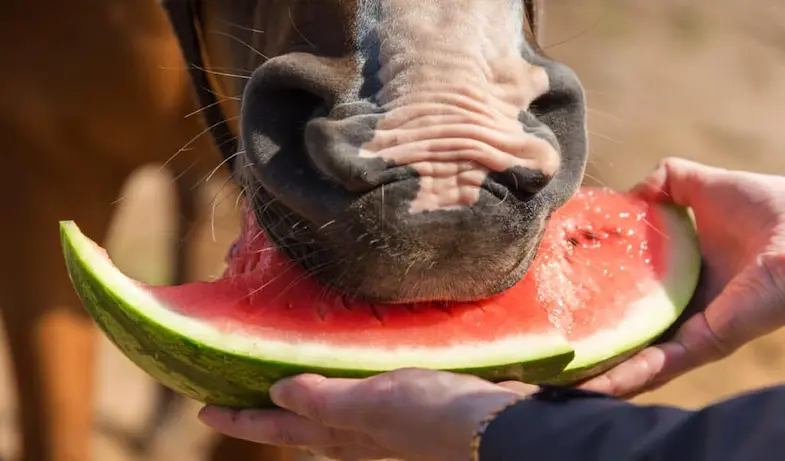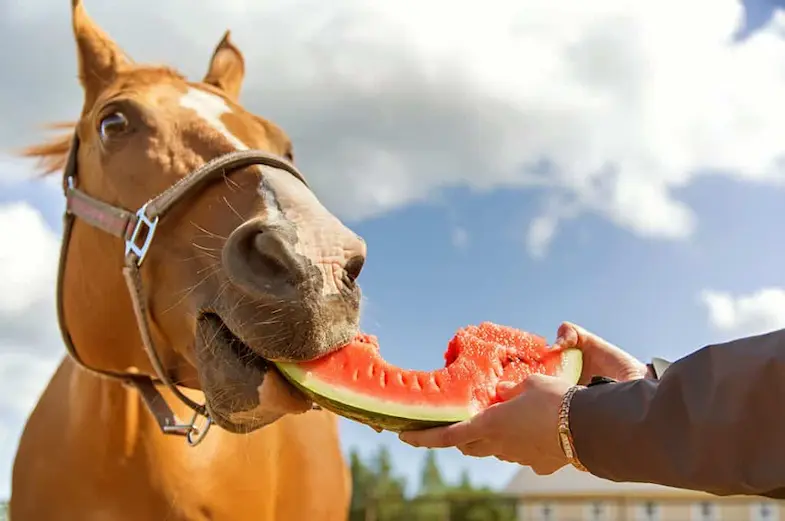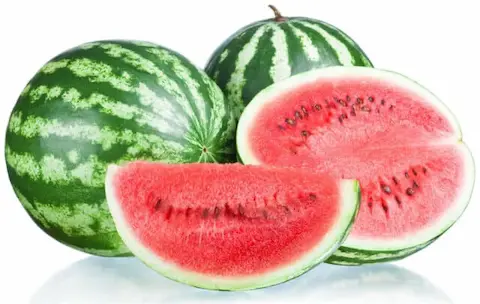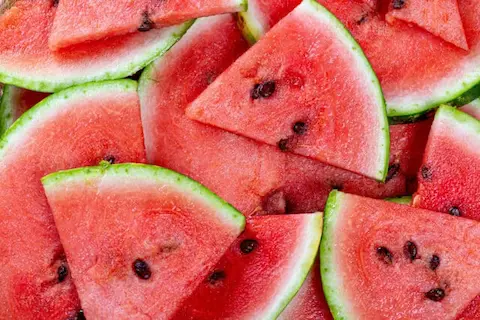We all love the refreshing taste of watermelon, especially when the weather heats up but are they okay to feed to our horses too? The good news is that yes there’s no reason at all why a healthy horse can’t, or even shouldn’t, enjoy watermelon at any time of year.
You may be surprised at just how much of the watermelon is okay for a horse to eat, from the flesh to the rind and even the seeds in small quantities.
Are watermelons healthy for horses?
You might think that the water content of a watermelon means that other than being a refreshing snack it doesn’t have any benefit, after all, how can something that is around 90% water contain any goodness at all but this isn’t the case. Watermelons can make a surprisingly healthy treat for your horse, they can also be a great source of water during the hot summer months.
As well as being fat-free, containing absolutely no cholesterol, having only 30 calories per 100g and being low in sodium, watermelons also contain a range of vitamins, minerals, and other nutrients that have an array of benefits for your horse:
- Vitamin A – Not only will Vitamin A help to look after a horse’s eyes and protect them from aging but will also boost his immune system and help to support his bone health.
- Vitamin B6 – This helps to keep your horse active by turning carbohydrates and fats into the energy his body needs.
- Vitamin C – We all know that Vitamin C helps to strengthen the immune system but it also helps to repair cell and tissue damage, keeping your horse healthy.
- Calcium – Not only does calcium strengthen bones, teeth, and hooves but a horse’s heart, muscles, and nerves also need it to function properly.
- Iron – Like a lot of other vitamins and minerals, iron can help to boost a horse’s immune system but it can also aid in the digestive process as well as help in the production of energy.
- Magnesium – Known for its anti-inflammatory benefits, magnesium can also help to fight depression and reduce insulin resistance.
- Phosphorus – Like calcium, phosphorus is used to build strong teeth, but it also manages how a horse’s body stores energy. On top of that, it can also reduce pain after exercise and filter out waste from the kidneys.
- Potassium – Potassium will not only keep your horse’s heart healthy but will also help to keep his muscles and nerves working.
- Amino acids – The rind of the watermelon contains citrulline which is an amino acid that’s needed by the body to relax blood vessels and increase the flow of the blood. The citrulline is converted to arginine which is used but the horse’s body to produce nitric oxide, this is then used to lower blood pressure, combat fatigue, and promote good vascular health. As an interesting side note, the Latin name for watermelon is Citrullus Lantus, which hints at the presence of citrulline.
- Fiber – We all know how important fiber is to a horse’s diet and while the flesh might not contain a lot, the rind certainly does, in fact around 17% of the rind is fiber.
Watermelons make a healthy, and juicy treat for horses
Is there a lot of sugar in watermelons?
A lot of people worry about the amount of sugar in watermelons but while there is some sugar there’s not as much as you might think, especially for a sweet-tasting treat. Just 6% of the whole watermelon (including the seeds and rind) is sugar which works out to be around 6g of sugar for every 100g of watermelon. Now that may sound like a lot but when you consider that a carrot has 4.7g of sugar for every 100g and that grass can contain anywhere between 15g and 25g (depending on the time of year) of sugar per 100g, a watermelon’s sugar content doesn’t seem so high.
Can horses eat watermelon rinds?
Many of us will through away the bitter-tasting rind thinking there are no health benefits to it but our horses seem to know better, while the flesh is mainly water (with a handful of vitamins and minerals) the rind itself is packed full of goodness. It’s high in fiber which is essential to a horse’s daily diet but also contains potassium, citrulline as well as the same selection of vitamins and minerals as the flesh.
While the rind is perfectly okay for horses to eat it’s important that it’s prepared in the right way. You might think that all you need to do is cut it up and feed it to your horse but, while this may be okay for organic watermelon it’s a big no-no for all other watermelons. Before cutting it up you should wash it in cool water and scrub it with a brush. This might seem a little bit over the top, but many watermelons are covered in pesticides that can contain bacteria such as E. coli that can, if not removed, contaminate the knife and transfer to the flesh as you cut it.
Watermelon rind if full of vitamins and fiber, making it ideal for horses
Can horses eat watermelon seeds?
Some horses may not like the taste of the seeds but there’s nothing wrong with them eating them as part of the watermelon. Like apple seeds and those of many other fruits, they do contain cyanide but it’s in such a small amount that if your horse (or you) eat them occasionally it won’t do it any harm. Small amounts of cyanide take around 24 hours to leave the body which is why they’re okay to eat occasionally, although you should NEVER feed the seeds on their own to horses.
If you are worried about the seeds though you can now buy seedless watermelons.
Can all horses eat watermelons?
Watermelon is a healthy treat for most horses but there are some dental and dietary conditions where feeding watermelon isn’t possible or advisable.
Dental issues
Just like us, as horses get older they can have problems with their teeth that can make chewing tougher foods more difficult and therefore make it harder for them to eat the watermelon rind, although they may still be able to eat the flesh without any difficulty.
Hyperkalemic periodic paralysis
Hyperkalemic periodic paralysis (or HYPP) is a disease that means horses need to keep their potassium level low and although watermelons don’t have a lot of potassium, in these cases they should be avoided.
Insulin resistance
Horses that have any kind of insulin-resistant condition, whether its Equine Cushing’s Disease, pituitary pars intermedia dysfunction (PPID), equine metabolic syndrome (EMS), or any other disorder should avoid watermelon because of the levels of sugar in it.
How much watermelon can horses eat?
We’ve all heard it before, moderation, moderation, moderation, and watermelons are no different, too much can prove difficult for your horse to diet and could lead to colic or other digestive problems. The high water content of watermelons can also make your horse feel full up and therefore not want to eat his normal food which, over time could result in a nutrient deficiency.
While watermelons don’t have the highest amount of sugar they can contain a fair amount if you feed your horse a lot which may cause dental problems and other health issues. Too much sugar can also increase your horse’s energy levels which aren’t always advisable, especially if your horse doesn’t have a way of getting rid of the excess energy.
There are no guidelines or recommendations about how much you should give your horse but I’d personally suggest that you feed it as an occasional treat and no more than a couple of cups at any one time. After all, you wouldn’t eat a huge amount in one go either would you?
Feeding your horse watermelon for the first time?
Horses have a very sensitive digestive system that can be very easily upset, especially when there’s any sudden change to their diet which is why you should introduce any new foods slowly. Even if your only feeding your horse a treat you should still introduce it to his diet gradually. Try him with a small cube of watermelon first and then if that goes okay you can give him a little bit more next time.
It’s also worth keeping in mind that all horses are different and while some will love the taste of watermelons others will hate it and there’s no way to tell if your horse will like it or not. If he won’t eat it don’t worry, he may be unsure of it because it’s new, instead offer it to him again another time and if he still doesn’t want it then maybe he just doesn’t like it – which means there’s more for you!
How should you feed watermelons to horses?
You should always thoroughly wash a watermelon before feeding it to your horse but it’s also important to cut it into small chunks so that he won’t choke on it but other than that, how you feed them to your horse after that is up to you. Some horses don’t like frozen watermelon but love it when it comes from the refrigerator, they find it refreshing whilst not being too cold.
If your horse does like frozen watermelon then you can either freeze the chunks and feed them to your horse straight from the freezer or if it’s really hot, you may prefer to make a frozen block instead. To do this put the cut-up pieces (along with any other fruit your horse likes) in a container of water and simply put that in the freezer. When it’s frozen though you can feed it to your horse. The water will keep him cool but he’ll also get to eat the fruit as it melts. This can also be used as a boredom-busting ‘toy’ too.
Mixing a few chunks with your horse’s feed may make his meals more interesting and encourage him to eat everything if he often leaves food in his bucket.
You can also mix the watermelon with wheat (or bran), oats, and coconut oil to make delicious treats that your horse will love.
Can horses eat other types of melon?
It doesn’t matter if it’s honeydew, cantaloupe, Galia, or any other type of melon, horses are okay to eat all of them. The nutritional value will vary from melon to melon and of course, your horse might not like the taste of all of them but there’s absolutely no reason why he can’t eat any type of melon.
I hope you found this article helpful. If you did I’d be grateful if you could share it please as it would really help me.
Recommended products
Over the years I have tried hundreds of different horsey products, from various blankets and halters to different treats. Some I’ve loved, others I’ve hated but I thought I’d share with you my top all-time favorite products, the ones I never leave the yard without. I’ve included links to the products (which are in no particular order) that I really think are great.
- Horse Knots by Reference Ready – If you’re like me and enjoy pocket reference guides then you’ll love this knot tying guide. These handy cards can easily fit in your pocket or attach to the saddle for quick reference. They’re waterproof, durable and are color coded to make them easy to follow.
- Mane ’n Tail Detangler – Even if you never show your horse you’ll need to detangle his tail from time to time (and possibly his mane too) which is always a challenging chore! I’ve found that if I run a little bit of detangler through my horse’s tails every few days it stops them from getting matted up and makes combing them easy, even if they’re coated in mud. I don’t know if I should admit to this or not but it also works wonders on my hair.
- TAKEKIT Pro clippers – Over the years I’ve tried a lot of different clippers and while some were obviously better than others I found these to be by far the best. They are heavier than a lot of other clippers but for me, that’s a good thing, it makes them feel more sturdy and hardwearing. On top of that they have a range of speeds so are just as good for clipping your horse’s back as they are his face. I also like the fact that they come in a handy carry case but that’s not for everybody. The company that makes them is super good and incredibly helpful too, a real bonus these days. The only thing I wasn’t keen on was the fact that it doesn’t come with any oil, but that’s not a major problem as it’s not difficult to buy lubricant.
- Shire’s ball feeder – There are so many boredom buster toys out there but I like to use these every day, regardless of whether or not my horses are bored. I find that it helps to encourage my horses to problem solve by rewarding them with treats (or pieces of fruit) but it also mimics their natural grazing behavior which helps to keep them calm and de-stressed.
- Horse safe mirror – This is a strange one that many people are surprised about but I like to put horse safe mirrors in the trailers as well as in the quarantine stalls. It helps to prevent the feeling of isolation by giving the impression of other horses being around. Being herd animals horses can get extremely stressed when they feel that they’re on their own but with these stick-on mirrors, they believe that at least one other horse is with them.
- Rectal thermometer – I know this isn’t glamourous at all but it’s vital for your horse’s well-being to be able to check their temperature and a rectal thermometer is the easiest way of doing this which is why I’ve added it to the list.
Shopping lists
I’ve also put together a few shopping lists of essential items that I’ve found helpful over the years. I’ve broken the lists down into different categories rather than put everything in one massive list 😉





